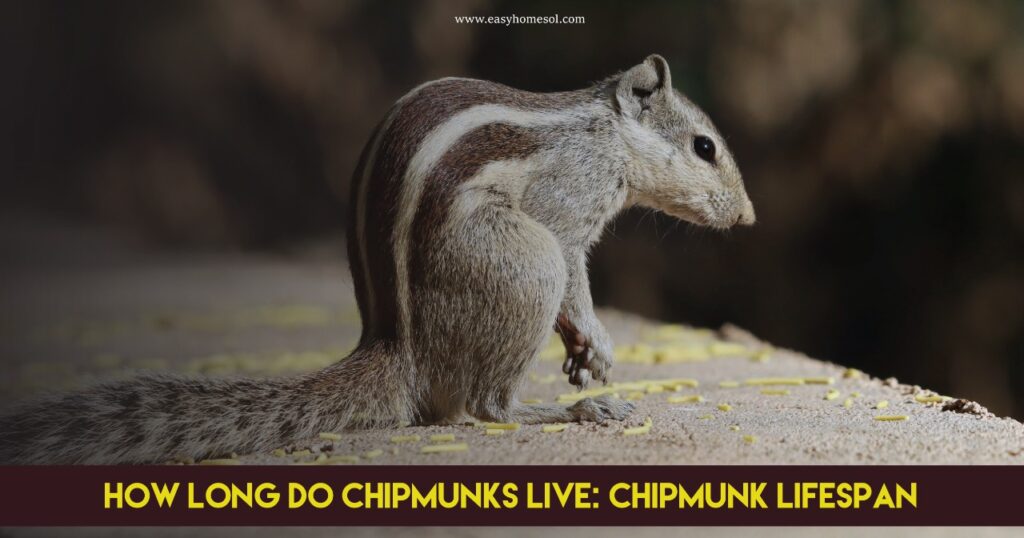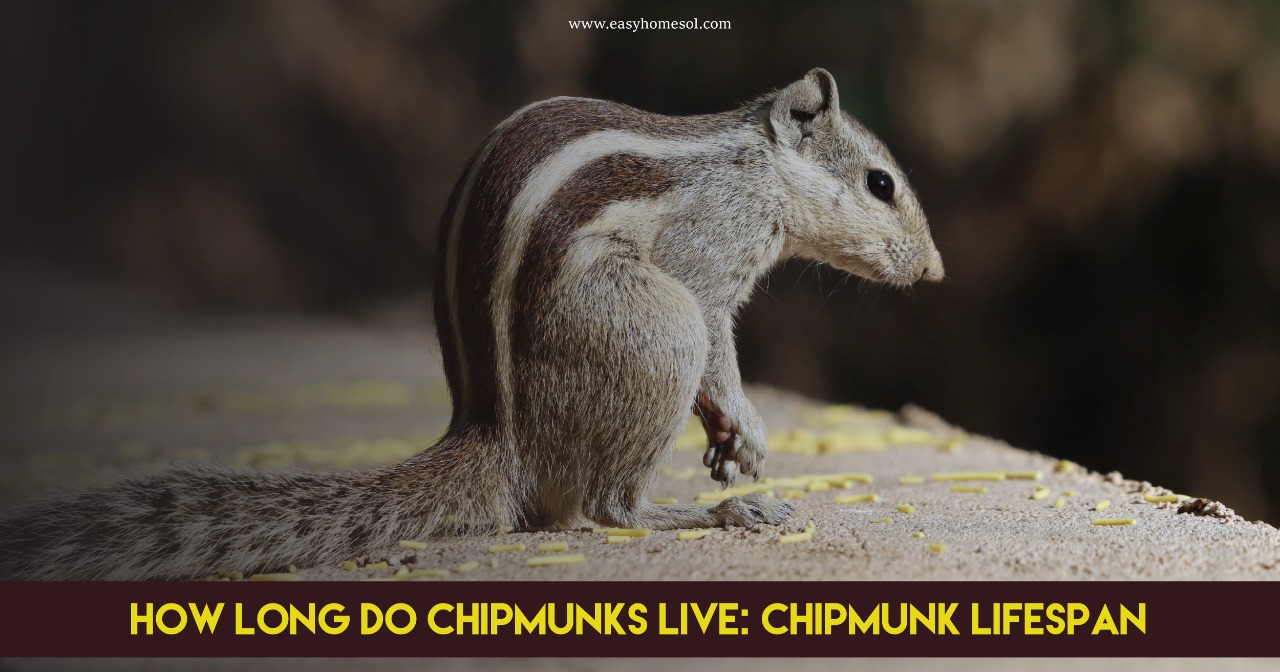
Chipmunks are common in North America, but how long do these small rodents typically live? Are they short-lived creatures, or can they live to old age? While there is no definitive answer to this question, research has been conducted that suggests chipmunks have the potential to live anywhere from three to nine years. this article will discuss how long do chipmunks live
Habitats & Diet
Habitats & Diet play a significant role in determining how long chipmunks can live. Chipmunks are small, ground-dwelling rodents found worldwide, primarily in North America and Eurasia. They typically make their homes among rocks, logs, or underground burrows where they can build nests and store food for winter. Their Diet includes grubs, nuts, berries, fruits, seeds, mushrooms, and even bird eggs, if available.
Chipmunks are resourceful animals who adapt to whatever environment they find themselves in – an urban park or a remote forest! When living close to humans, they may scavenge from compost heaps or picnic baskets left behind by visitors.
Average Chipmunk Lifespan: how long do chipmunks live
Chipmunks are small, furry mammals that live in many different parts of the world. They are known for their playful antics and are often used as cartoon characters in children’s books and movies. But how long do chipmunks live? The average Lifespan of a chipmunk is between two and three years, depending on its environment.
In the wild, chipmunks face many predators, such as foxes, hawks, cats, raccoons, snakes, and owls. This means they must be very vigilant to survive even just one season. Most chipmunks do not make it past the age of two due to these predators or natural factors, such as starvation during harsher seasons.
Factors that impact Lifespan of chipmunks
Chipmunks are small, fluffy rodents that live throughout the United States. While they may seem, harmless woodland creatures, chipmunks have an impressive lifespan if given proper care. Factors such as Diet and environment can influence how long chipmunks live, with some living up to seven years in captivity.
To understand what affects a chipmunk’s Lifespan the most, it is essential to look at its natural habitat and behaviors in the wild. Diet is one of the most significant contributors to a healthy lifestyle and can play a critical role in how long chipmunks live. Typically, these mammals feed on nuts, seeds, mushrooms, insects, and berries, which provide necessary nutrients for growth and development. Additionally, providing access to clean water will ensure they stay hydrated and healthy. In the wild, both environmental and predatory pressures can contribute to a shorter lifespan for chipmunks. Extreme weather conditions, such as extreme heat or cold temperatures, can impact a chipmunk’s ability to find food and shelter leading to increased mortality rates.
Types of Chipmunks
Chipmunks are a small rodent species native to North America and Eurasia. Known for their stripes and bushy tail, chipmunks make an exciting pet or backyard visitor. There are 25 chipmunk species worldwide, each with its unique appearance.
The Eastern Chipmunk is the most common type in North America and is easily identified by its reddish-brown fur and white stripes running along its back. It has five dark lines on its face that contrast beautifully against its light fur coloration. The Eastern Chipmunk lives in dry meadows, fields, forests, and near residential homes.
The Siberian Chipmunk is one of the rarer types found mainly in Asia.
The Siberian Chipmunk is a small rodent belonging to the ground squirrels known as the Cricetidae. It is native to Siberia, the Far East regions of Russia, and some parts of Japan. The Siberian Chipmunk has a reddish-brown upper body with pale yellow stripes across its back, and its underside is usually white or light grey. It has short ears, a short tail, and large black eyes.
The Siberian Chipmunk lives in temperate forested areas and rocky habitats near rivers and streams. It feeds on seeds, nuts, fruits, insects, and other invertebrates. In winter, it hibernates in underground caves for up to 8 months.
Alpine Chipmunks are one type of chipmunk found living in North America. They are found in the western United States and Canada mountain regions. Alpine Chipmunks are smaller than most other chipmunks and have a grayish-brown coat with dark stripes along their back and sides. They have white cheeks, ears, and feet. Alpine Chipmunks feed on seeds, nuts, fruits, insects, and other small animals. They are active during the day and nest in burrows or crevices near rocks or tree roots.
Here are some frequently asked questions
Do chipmunks remember humans?
Chipmunks are intelligent creatures, and they can remember humans. They can remember people who feed them, give them treats, or take care of them in other ways. They may even recognize a person’s voice or a particular scent associated with that person. Chipmunks tend to be quite cautious around humans, so you must approach them slowly and gently to gain their trust. With patience and kindness, chipmunks can become friends with people and even come close to petting and hand-feeding. Once a chipmunk has developed a bond with you, it will likely remember you for years to come!
Do chipmunks live in the same place every year?
Chipmunks are small, active animals found in many different regions of the world. Although they may live in the same general area for years, chipmunks do not usually stay in the same place for an entire year. Instead, they make homes in tree cavities and construct nests lined with soft bedding like leaves and twigs. From these nests, chipmunks will venture out into their natural habitat to search for food and explore their environment.
They may remain near their nest for weeks or take short trips away to find food and other resources. During colder months, chipmunks will typically become inactive and hibernate until warmer temperatures arrive again. As such, although chipmunks don’t necessarily stay in the same spot year-round, they return to familiar areas frequently enough to be seen as residents of a particular region.
Do chipmunks mate for life?
Chipmunks are solitary creatures that do not generally mate for life. They will form temporary relationships during the mating season, and females chipmunk may have multiple mates throughout their lifetime. The mating process typically involves a period of courtship followed by a brief mating session. Afterward, chipmunks usually go their separate ways, and each raises their young independently. Chipmunks can also be quite territorial and may fiercely defend their territory against potential rivals. Despite this, it is possible to observe a pair of chipmunks living nearby for extended periods, suggesting that some species may form more permanent pair bonds.
How do you get a chipmunk to trust you?
Gaining the trust of a chipmunk can be a rewarding experience, but it takes time and patience. The first step is to provide plenty of food and water in a safe, secure place. It helps to ensure plenty of hiding spots and locations for the chipmunk to explore. After this, start visiting the area regularly so the chipmunk can become used to seeing you around. Begin by leaving small treats near where they live or throw them nuts or seeds from a distance.
As time passes and the chipmunk becomes more comfortable with your presence, you can slowly move closer until, eventually, you can hand-feed them. Make sure to speak in low tones and avoid sudden movements, as too much noise or activity may frighten them away. Finally, remember that it might take weeks before they truly trust you, but once they do, you’ll have built an endearing bond with your new friend!
Do chipmunks like to be petted?
Chipmunks are cute little creatures that can often scurry around the garden. They are naturally curious animals and may seem to enjoy human contact. Still, it is essential to remember that chipmunks should not be touched or petted without proper training. While some people may consider a petting session with a chipmunk enjoyable, it is likely to cause the chipmunk distress and stress as it does not understand why a human is touching it.
Petting a chipmunk can also put them at risk of injury as their small size means they can easily escape from an inexperienced handler’s grasp. If you want to interact with a chipmunk, always do so from a distance and never attempt to touch or capture one.
They are wild animals and not domesticated. They usually live in the wild, so they can be unpredictable and may carry diseases that could harm humans or other animals in the home. Additionally, chipmunks require a specific diet and environment to stay healthy, which can be challenging to provide in a home setting. For these reasons, it is best to avoid keeping chipmunks as pets.
Is it OK to feed wild chipmunks?
Feeding wild chipmunks is generally not recommended. Chipmunks are wild animals and should be left to forage for their food. By providing them, you could teach them to rely on humans for sustenance and make them less fearful of humans, which could lead to increased interactions with people.
This could ultimately increase the spread of disease and other negative consequences. Additionally, many types of human food can be unhealthy or even dangerous for chipmunks, so it’s best to avoid feeding them altogether. If you have a chipmunk that regularly visits your yard, you can provide a few small birdseed snacks as an occasional treat. Still, it’s important not to overfeed or make them too comfortable around people.
What can I put down a chipmunk hole to get rid of them?
If you have a chipmunk living in your yard, it can be challenging to get rid of them. The most common way is to use traps or poisons, but these methods can be dangerous and ineffective if not done correctly. Another option is to fill the chipmunk hole with steel wool or other materials they cannot chew through, which will block their passage and discourage them from returning. You can also try sprinkling cayenne pepper, mothballs, or ammonia around the area, as these all have strong odors that chipmunks do not like. If all else fails, you may need to call a wildlife removal service for help.
Captive Chipmunks vs. Wild Chipmunks
Captive chipmunks and wild chipmunks have one significant difference – their life span. Wild chipmunks are known to live for up to 4-5 years, whereas captive chipmunks can survive up to 8 years with proper care. Chipmunk owners should consider the increased Lifespan when deciding which type of pet they want in their home.
The life span of a captive chipmunk is usually longer because they are provided with everything they need including food, shelter, water, and medical attention when needed. In addition, captive chipmunks do not have to deal with predators or diseases that can be found in the wild. Since they can live in a stress-free environment without worrying about survival, it allows them to live longer than wild ones.
Conclusion
Chipmunks are small rodents belonging to the Sciuridae family, including ground squirrels, prairie dogs, and tree squirrels. Although they are relatively small in size, chipmunks have surprisingly long lifespans. According to researchers, the typical Lifespan of a chipmunk is between three and five years; however, in captivity, they can live up to eight or nine years.
The critical factor affects how long chipmunks live in their natural environment. In the wild, chipmunks face Predators such as foxes, coyotes, and hawks, and they are also more susceptible to illnesses caused by parasites and bacteria found in their environment. On the other hand, those living in captivity may enjoy a diet rich in nutrients while having less exposure to predators and disease-causing organisms, increasing their chances of living longer.
